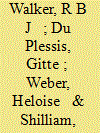|
|
|
Sort Order |
|
|
|
Items / Page
|
|
|
|
|
|
|
| Srl | Item |
| 1 |
ID:
152732


|
|
|
|
|
| Summary/Abstract |
This article engages in an experiment that aims to push critical/post-structuralist thought beyond its comfort zone. Despite its commitment to critiquing modern, liberal ontologies, the article claims that these same ontologies are often tacitly reproduced, resulting in a failure to grasp contemporary structures and histories of violence and domination. The article brings into conversation five selected critical scholars from a range of theoretical approaches and disciplines who explore the potential of the notion of “fracture” for that purpose. The conversation revolves around political struggles at various sites—migrant struggles in Europe, decolonial struggles in Mexico, workers and peasant struggles in Colombia—in order to pinpoint how these struggles “fracture” or “crack” modern political frames in ways that neither reproduce them, nor lead to mere moments of disruption in otherwise smoothly functioning governmental regimes. Nor does such “fracturing” entail the constructing of a “complete” or “coherent” vision of a politics to come. Instead, we detail the incoherent, tentative, and multiple character of frames and practices of thought in struggle that nevertheless produce an (albeit open and contested) “whole.”
|
|
|
|
|
|
|
|
|
|
|
|
|
|
|
|
| 2 |
ID:
158668


|
|
|
|
|
| Summary/Abstract |
As students and scholars of global politics, we have been witnessing, participating in, and feeling the effects of recent global upheavals. These include specific events, such as the election of Trump and the vote for Brexit, but are better understood through their resulting political effects (e.g., pushing back on migration, hardening national borders, denying climate change, reneging on trade deals, gutting the welfare state, increasing resource extraction, and curtailing rights). Commentators refer to these upheavals in different ways: a rise in populism, reinvigorated nationalism, the new fascism, a polarization of Right and Left, the end of globalization, and posttruth politics. These labels have not only generated a great deal of scholarly debate, they have also helped generate multiple energies, including activism, protest, and politicization. Such developments feel at once totally unprecedented but also eerily familiar. More to the point, they have very different manifestations in different parts of the world; indeed, one of the difficulties of the present moment is the lack of analysis about the global ramifications of these upheavals.
|
|
|
|
|
|
|
|
|
|
|
|
|
|
|
|
| 3 |
ID:
145115


|
|
|
|
|
| Summary/Abstract |
The authors in this collective discussion engage, disaggregate and unpack the triangulation of security, technology and architecture, across a range of contemporary spaces/places. Reflecting diverse interdisciplinary commitments and perspectives, the collective discussion considers security, technology and architecture in urban environments and global/local interfaces, borders, borderlands and ports of entry, and even the sensorium, from soundscapes of the airport to teargas laden environments. From quotidian to high-tech, these interventions tease out the increasing ferocity of architecture and/in its relationship with technology and security.
|
|
|
|
|
|
|
|
|
|
|
|
|
|
|
|
|
|
|
|
|